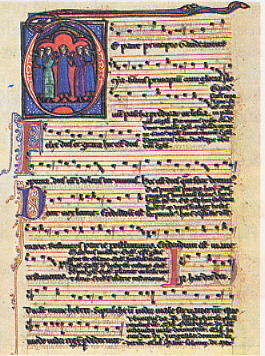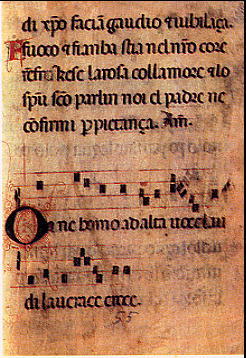| Gregorian music was monodic: actually all the singers played the same melody at the same time. Instead, the polyphonic music presented two or more melodies which were played by more voices or groups of voices. The most ancient example dates back to 860. Actually, little by little, other notes were added as accompaniment to the melody of the Gregorian melody. So the Organum was born. It was a polyphonic form used from the IX century which had its most considerable development from the XII to the XIII century. | |
| There are two principal reasons for the diffusion of singing with more
voices: 1. the affirmation of the notation on stave, that allowed to mark the real high of
sounds, 2. the possibility to determine the values of the length of notes, at first using rhythmical ways and, after the middle of the
XIII century, using the mensural notation. For two centuries the polyphony or counterpoint ( From Latin Punctum contra Punctum -note against note ), developed in the period called Ars Antiqua (from the middle of the XII to the XIV century ). The centres of this music weren’t the monasteries any more, but above all the cathedral of the town. The most important school
of Ars Antiqua is connected with the church. Mister Perotino, the greatest figure of the
polyphonic school of Notre- Dame in Paris, brought the number of voices up to
four.
He used the method of holding the single notes of the Gregorian chant
for a long time and on these notes he added other melodies. Example of "organum" of Nôtre-Dame school |
 |
|
The more the polyphony became important and elaborate, the less the common people were able to follow it: either for the melodies that laid one upon the other or for the latin texts that, spoken by the several singers simultaneously, weren't clear at all. So the need of an easier kind of sacred music was born, a music that found its highest artistic expression in the "lauda". The monodic form and the use of the language spoken by the common people, the vulgar, helped them (the lauda) to spread more quickly. "Lauda" were born in Umbria and they were sung by Saint Francis and by his disciples. In a very short time many real, proper plays derived from the "lauda".
Example of "Lauda" |
 |